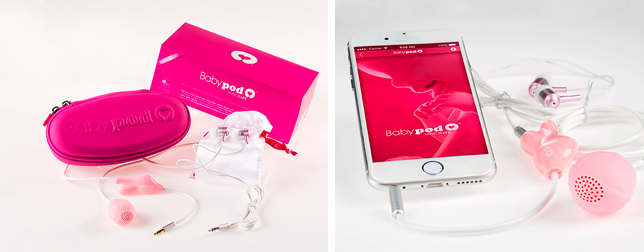Dr. Alex Garcia-Faura, Scientific Director at Babypod, will be speaking at the WT | Wearable Technologies Conference in Barcelona on February 24. Music has many benefits for the human brain, can improve learning capabilities, stimulates communication and language, and the form of expression and coordination of movements. Babypod, a small vaginal device, can stimulate vocalization of babies before birth with music. Dr. Alex Garcia-Faura explains how it works and what the benefits are:
We are proud to have you on stage in Barcelona on February 24 with your very special product. Do you have a musical background? How did you come up with the idea for the product?
I studied music theory, solfa and flute for 12 years in Barcelona. I also had a one year stage in Chicago to study opera, chorus and drama.
Our clinical reseach during the last three years has been focused on the effects of music during the early stages of life; in our preliminary studies, applying music to pregnant patients using abdominal speakers, we discovered that there was no fetal reaction to music and that the fetus would only be able to hear it as a distorted whisper because of the effects of the abdominal wall. We thought that it would be necessary to get the music closer to the fetus, and we decided to try to apply the music vaginally. It was a great decision.
What was the most tricky part when making this product? When did you start developing and how long did it take you to get where you are today?
The most difficult part of this project was that we had no data and no literature available to review before setting the features of the first prototype. It was the first time that a fetus would listen to music in an effective and non-distorted way, and we didn’t know which volume to use, what sort of music to play, or how to evaluate the fetal response to the stimulus; during the first steps of this projects, the advice of medical experts on audition and brain development was mandatory to make sure that we would’nt be able to cause any harm: a clinical trial approved by an Ethics Committee was performed on 100 patients, and the results where published on The Journal of the British Society in Medical Ultrasound.
The first prototypes used as a vaginal musical device were designed about two years ago, and were used for the preliminary clinical trials with a great success. The Babypod is the result of the evolution of this prototypes, that have already been used on more than 1.000 pregnant patients in different clinical studies.
Wearables that are worn inside the body rise higher health concerns than a wristband for example. What is your answer to questions like radiation and other potential harmful effects of electronic devices?
The design and development of the Babypod has always been based on scientiffic evidence obtained on our clinical trials performed by gynaecologysts. All he results referring to the effects of Babypod on pregnancy and fetus have been published on medical journals, and reviewed by Ethics Commitees.
We decided that the Babypod would not be a wireless device just because we didn’t have the evidence that Bluetooth o Wi-fi would be safe for the fetus.
What are the benefits of your product for an unborn child? What kind of music do you suggest to play to a baby – also after birth?
We already know that early sensorial stimulation with music has been shown to be good for kids, specially to develop higher skills in speech and communication. The Babypod is the only device thas has been able to produce a fetal response with specific speech movements, when music is played vaginally after the 16th week of pregnancy: now we have the chance to start activating this brain pathways before birth. Further studies will be necessary to evaluate long term benefits on this kids.
One of our largest studies with babypod has to do with fetal reponse to different types of music and different types of human voice. The results might be available during this year and will be presented on medical congresses in obstetrics and perinatology. Mozart is one of the best stimulus for fetal reaction, but also some ancestral types of music that have been played and preserved for more than 500 years.
What is your favorite wearable besides your own of course?
I’m just waiting to find it in this 2016 WT meeting … but I’m sure that it will have to be related to passion for music !!
You want to talk to Dr. Alex Garcia-Faura and the Babypod team in person and learn more about this product? Don’t hesitate to contact us for a code to unlock registration.









